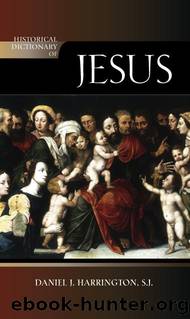Historical Dictionary of Jesus (Historical Dictionaries of Religions, Philosophies, and Movements Series) by Harrington Daniel J. S.J

Author:Harrington, Daniel J., S.J. [Harrington, Daniel J., S.J.]
Language: eng
Format: epub
Publisher: Scarecrow Press
Published: 2010-08-06T00:00:00+00:00
â I â
âI Amâ Sayings. The unique identity and authority of Jesus are brought out especially in Johnâs Gospel by the frequent use of the Greek formula ego eimi (âI amâ), which occurs around 30 times. In some cases there is a clear predicate: âthe bread of lifeâ (6:35, 6:41, 6:48, 6:51), âthe light of the worldâ (8:12, 9:5), âthe good shepherdâ (10:11, 10:14), and so forth. In other instances, the predicate is left uncertain (6:20, 18:5), and in still other passages âI amâ seems to function as a title on its own (8:24, 8:28. 8:58, 13:19). These uses of the âI amâ formula echo Godâs self-revelation to Moses on Sinai (âI am who I am,â Exod 3:13â14) and Godâs self-identifications in Isa 43:25, 51:12, and 52:6. The reaction of those arresting Jesus in John 18:6 (âWhen Jesus said to them, âI am he,â they stepped back and fell to the groundâ) suggests that to them the formula served to affirm Jesusâ status as divine.
Incarnation. The term in general refers to the embodiment of a deity or spirit in human form. When used with reference to Jesus, it concerns the preexistent Son of God or Word of God taking on human flesh and human nature as Jesus of Nazareth. The two most important NT witnesses are hymns about Christ in Phil 2:6â11 and John 1:1â18. According to the very early Christian hymn quoted by Paul in Phil 2:6â11, Jesus put aside his equality with God and âemptied himself, taking the form of a slave, being born in human likeness.â Moreover, Jesus so fully appropriated human nature that he suffered a shameful death, âeven death on the cross.â Likewise, according to the prologue to Johnâs Gospel, Jesus the Word (or Wisdom) of God who was with God and was God and so existed before all the rest of creation âbecame flesh and lived among usâ (1:14). Thus he was able to fulfill his role as the revealer and the revelation of God. For other NT passages about Jesus as the preexistent Wisdom of God, see Col 1:15â17 and Heb 1:3. These texts (especially John 1:1â18) figured prominently in early Christian reflection on and debate about the two natures of Christ (divine and human) and about relations among the persons of the Trinity. In some theological circles today, they provide the criteria of theological orthodoxy about Christ.
Infancy Gospels. Matthew and Luke preface their accounts of Jesusâ public ministry with narratives about his birth and infancy. They combine historical facts, biblical fulfillments and allusions, and theological statements about Jesus. It is often difficult, however, to distinguish one kind of element from another. The infancy narrative in Matt 1â2 emphasizes Jesusâ roots in Judaism, focuses on Joseph as a central character, describes the miraculous (virginal) conception of Jesus as fulfilling Isa 7:14, portrays the Magi as coming to pay homage to the infant Jesus, and traces the Holy Familyâs escape from the murderous intent of Herod the Great by their journey from Bethlehem through Egypt to Nazareth.
Download
This site does not store any files on its server. We only index and link to content provided by other sites. Please contact the content providers to delete copyright contents if any and email us, we'll remove relevant links or contents immediately.
It's Never Too Late by Kathie Lee Gifford(627)
The 9.9 Percent by Matthew Stewart(595)
Hebrews, James by George H. Guthrie & George H. Guthrie(582)
Take Back Your Time by Christy Wright(581)
Israel: Ancient Kingdom or Late Invention? by Daniel I. Block(556)
The New Oxford Annotated Bible with Apocrypha by unknow(552)
The Book Every Leader Needs to Read by 48 Authors(550)
Eating the Bible by Rena Rossner(539)
Insights on Hebrews by Charles R. Swindoll(535)
Psalms, Proverbs, Ecclesiastes, and Song of Songs by John W. Hilber & Tremper Longman III & Duane Garrett(511)
The Jew in the Lotus by Rodger Kamenetz(480)
Commentary on the Torah by Richard Elliott Friedman(468)
Judges: Volume Two by unknow(465)
Who Wrote the Bible? by Richard Elliott Friedman(459)
NKJV, Ignite, eBook by Thomas Nelson(439)
Commentary on James (Commentary on the New Testament Book #16) by Robert H. Gundry(435)
Proverbs, Ecclesiastes, Song of Solomon (Ancient Christian Commentary on Scripture) by J. Robert Wright(431)
Job, Ecclesiastes, Song of Songs by August H. Konkel & Tremper Longman III(427)
Reading the Bible with Rabbi Jesus by Tverberg Lois(409)
